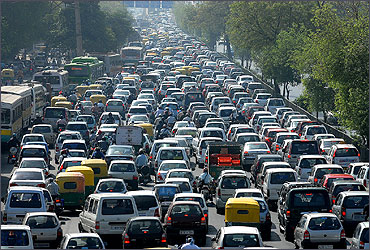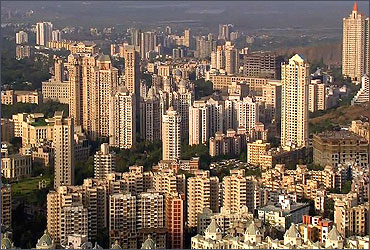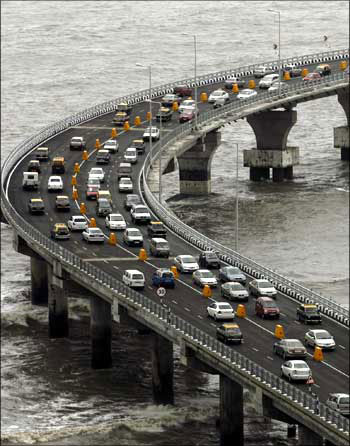Photographs: Reuters
Developing new mass rapid transit system (MRTS) will help decongest the already choked roads of Mumbai and cope with rapid urbanisation, according to a report by industry body Assocham.
"Crumbling infrastructure in Mumbai will be inadequate to bear the projected population of 3.3 (33 million) crore by 2030 up from over 2.3 crore (23 million) at present. Introduction of an MRTS will help decongest the roads and cope with rapid urbanisation in and around the country's financial capital," the Associated Chambers of Commerce and Industry of India (Assocham) said in a study, titled 'Urbanising India and mega metro network: Vision for the emerging cities of India 2030'.
. . .
How Mumbai can cope with urbanisation
Photographs: Reuters
According to the study, the number of cities with over 10 lakh (1 million) population will increase from 48 to 68, while cities with population of over 40 lakh (4 million) will almost double from seven at present to 13 in the next two decades.
"The rapidly progressing city lacks a credible public transport system as the existing road and rail network cannot take the load any longer. The government, therefore, needs to put the metro project, which can end transportation woes of the city, on a fast track," Assocham secretary general DS Rawat said.
. . .
How Mumbai can cope with urbanisation
Photographs: Reuters
Noting that the Delhi Metro has significantly reduced air pollution, road accidents and traffic congestion apart from saving fuel, it said, "fuel saving due to the Delhi Metro could notch up to Rs 8,000 crore (Rs 80 billion) in 2011-12 and rise to Rs 15,000 crore (Rs 150 billion) by 2020."
The Delhi Metro has seen about 80,731 four-wheelers and 4.8 lakh (480,000) two-wheelers going off the roads, the report said, adding that it has also ensured that 4,767 buses are off the streets which resulted in over 2 lakh (200,000) more people using the Metro in the capital.
. . .
How Mumbai can cope with urbanisation
Photographs: Reuters
By 2015-16, the reduction in number of four-wheelers and two-wheelers is projected to reach 2.4 lakh (240,000) and 1.5 lakh (150,000), respectively in the national capital, and that of buses to 12,388, the study said.
"An MRTS will help reduce the extent of pressure on existing suburban transport systems and is an imperative to meet the future demand. It is not just environment-friendly but is also a financially viable and an economical transport mechanism attractive to commuters. MRTS will also help reduce fuel cost and travelling time," it said.





article